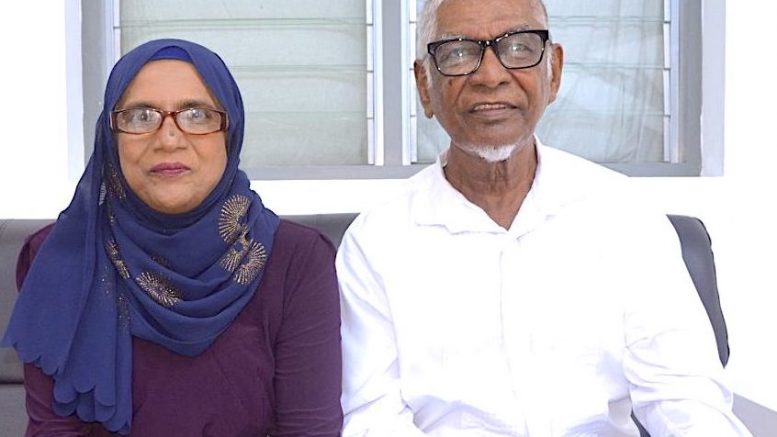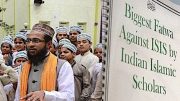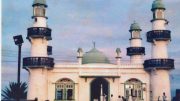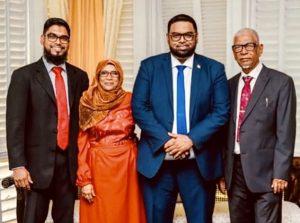
From right to left: Mr Mohamed Osman Ali (father), President Mohamed Irfaan Ali, Bibi Shariman Neshaw (mother), Mohamed Aqtar Ali (brother)
Guyana’s President Dr Mohamed Irfaan Ali’s mother, Bibi Shariman Ali, is a daughter of Leguan Island, Essequibo region. She is an educator, curriculum developer, administrator, policy maker, and children’s rights advocate in both the private and public sectors. Her roots in Leguan go back to when few Muslims inhabited the island.
Mrs Shariman Ali is the mother of two sons, Mohamed Aqtar Ali and Dr Mohamed Irfaan Ali. Hazrat (Sir) Mohamed Osman Ali of Leonora is her husband. Bibi Shariman Ali is also a grandmother of five adorable children.
Her parents named her Bibi Shariman Neshaw Ayube at her birth in Enterprise Leguan. Her mother, Hafizan (Shira) Dildar, is a native of Success, Leguan and Sheikh Mohamed Ayube of Enterprise, Leguan.
Bibi means Lady or “Lady of Rank” Neshaw (Nisa) also means Lady or “Lady of Rank”. A suffix, Nissa, usually follows another name—for example, Khairun Nisa (best of women) or Zaibun Nisa (women’s adornment). Nissa was popularised in Mughal India from the names given to the princesses.
Marriage, Family and Ancestors
Nariman Ayube, Muntaz Ayube, Inshan Ayube, Imran Ayube, Naziman Ayube, and Shameer Ayube are Bibi Shariman’s siblings.
Juggling married life and raising two boys, Mrs Ali continued to pursue her career and calling with the full support of her husband, Osman Meah.
“Being able to pursue a career and maintaining a family life, I continued to study even after I got married and worked hard at ensuring that the family was not affected in any way,” said Shariman.
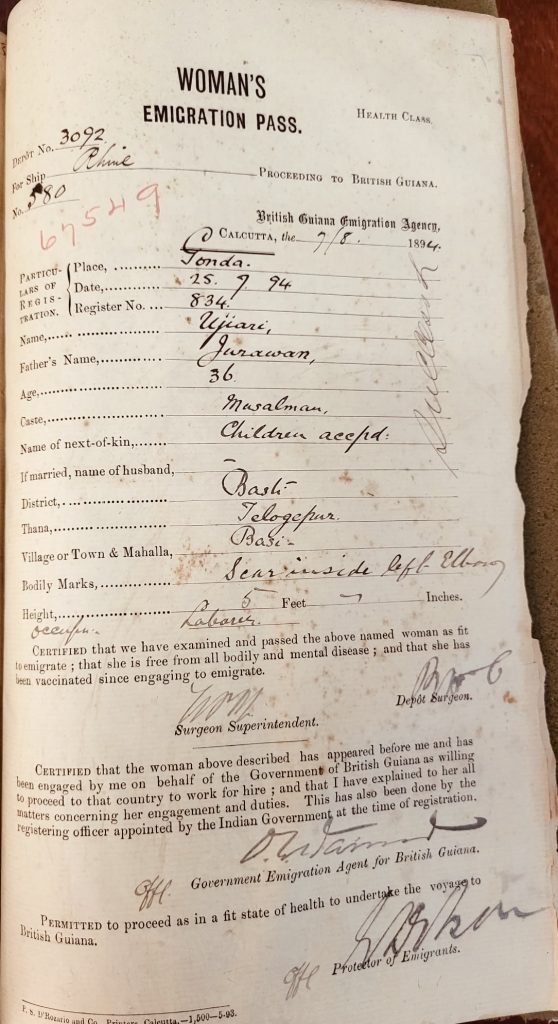
Gulzari’s Emigration Pass
A character trait rooted in Bibi Shariman’s ancestral DNA is resilience.
Bibi’s maternal ancestors go back five generations to her great-great-grandmother, Gulzari Zurawan, who left Uttar Pradesh, India, in 1893 for Guyana with six family members after her husband’s sudden death. Gulzari came with five children, including Dildar, who was seven. Shariman comes from his line.
The name Dildar comes from the Farsi language and reaches us through Urdu. The name Dildar means beloved, sweetheart, and generous. Dildar Meah lived to his name because people recall him as a Meah (a Bengali word used to refer to a gentleman and also used as a surname).
Dildar Meah married Bibi Zahuran and had several children; Abdul Ghani, Mariam, Hazra, Hanif, and Hameed. With the union of Hameed and Jamiran were born Sharifan, Hakiran, Hafizan, Nazir and Salim. With Hafizan’s marriage to Sheikh Mohamed Ayube, Bibi Shariman Neshaw Ayube was born.
“I feel very proud that Gulzari is my ancestor. Her story must have been one of endurance and untold hardships. Indentureship was difficult for all families, but it must have been doubly so for a single mom of five children. It took courage to leave her homeland for Guyana, but she did it because she sought a better life for her children. I saw my own Nani, Jameran Dildar, and my mother, Hafezan Ayube, reflected in her. I see myself reflected in her.” says Shariman.
Dildar was seven when he came with his mother. His elder brother Daulat was fifteen at the time of migration. At this age, he was considered a mature adult at that time. Together with his mother, they provided for the family. Like what his name in English means, Daulat was “strong”, “fortunate”, and blessed with “luck” that he stood by his mother to help raise his younger siblings.
Challenges and Fear
Bibi Shariman draws from all these stories of triumphs and tribulations that she has lived and isn’t afraid of challenges and getting out of her comfort zone. Yet, she adjusts well to simplicity and humbleness because it was part of her growing up.
“I do not get deterred by challenges. When I was appointed a Pupil Teacher at Western Hogg Island School, I accepted, though I was advised to think carefully as the terrain and living conditions there were rough. I wanted to work for unselfish reasons, so I stayed there until I went to Teachers’ Training College.”
Bibi Shariman overcame her fears and stepped out of her “comfort zone” to work at the National Educational Resource Centre at the Ministry of Education Guyana, where she was one of few women of her time to do so.
“Even staying there was an accomplishment because of the challenges I faced there,” she remarked.
When Bibi Shariman pursued her first degree, she kept a job. She travelled to University from Leonora daily while taking care of her family. At the same time, she was completing National Service.
Leguan Island, the Essequibo
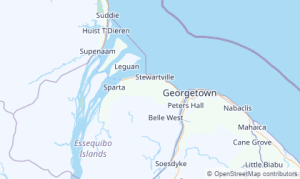
Leguan Island is a small island situated in the delta of the Essequibo River on the coast of Guyana, South America.
There is excitement when Bibi Shariman talks about Leguan, “Leguan is a place known for loving, caring, hospitable and hardworking people. It is a peaceful island where everyone lived well with one another despite their religion and ethnicity. People were polite and mannerly.”
Speaking about her early childhood in Leguan, Bibi Shariman said, “Life was very simple and without the luxuries that we have today. As a child, I had to do my share of household chores, including fetching water, going with my father to catch fish, taking food to the backdam for him, cleaning, etc. I also walked long distances to school on brick roads. This prepared me to work hard, live with little, be respectful, and love family and people.”
Bibi Shariman’s father, Sheik Mohamed Ayube, was born in 1924 at Enterprise to Habibul and Zainab (also spelt Jainab).
Shariman’s great-grandfather Hazrat Habibul Rahaman donated the land on which Enterprise Masjid was built.
Achievements and Contributions
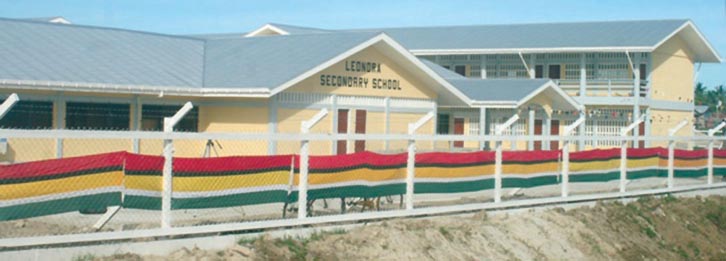
Leonora Secondary School (rebuilt 2011); Mrs Ali taught at this school (photo Guyana Times)
Bibi Shariman began teaching on Hogg Island, in the Essequibo River. That is where Shariman met her husband, Osman Ali. They were both teaching at Hogg Island. Osman Ali is the son of Bibi Sakina Ali, a political activist and Hazrat Kaiser Ali.
She dedicated many years as a teacher from the age of sixteen. All in all, Bibi Shariman has been a teacher for over 49 years. Even though she left the school system and went to Central Ministry in 1996, where she served in various capacities, she continued to teach.
Bibi Shariman was on the Rights of the Child Commission, and as the name suggests, she advocated for the rights of children in Guyana. There she prepared training materials and assessments and did training for the Guyana Elections Commission. Occasionally she makes presentations to various women groups on topics about family and children topics.
She is ready to work when the Ministry calls upon her for assistance. For eight years, Mrs Shariman Ali was the principal of a private school in Canada.
Today, Mrs Shariman Ali still reviews and develops resources for use by teachers and students, such as textbooks, students’ worksheets and teacher training modules for the Ministry of Education and other agencies.
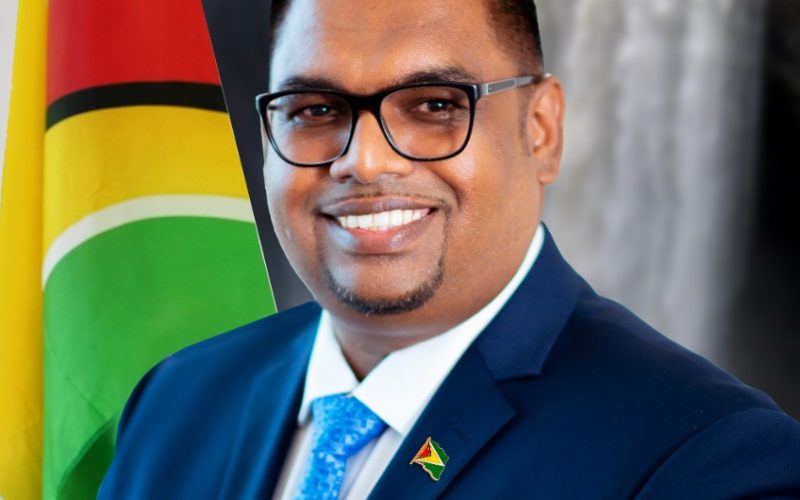
His Excellency President of Guyana Mohamed Irfaan Ali
President M. Irfaan Ali and M. Aqtar’s Mother
Reflecting on her elder son, Mrs Shariman Ali says.
“Aqtar has embraced all the values his father and I taught him as a child, and I am especially proud of that. He is kind, respectful, friendly and generous to his family members and everyone. He upholds the Islamic way of life and believes in maintaining family ties,” says Mrs Shariman Ali.
Like his brother, Irfaan, Aqtar can also cook and loves to entertain guests.
Bibi Shariman has remained “down to earth” and a proud mother of her boys. Reflecting on her son, Dr Mohamed Irfaan Ali, rising to the presidency of Guyana, she said.
“There are all kinds of emotions associated with that, but mostly I feel grateful to the Almighty that a son of mine has the opportunity to serve our country and its people at the highest level. I am proud of what he has accomplished so far; how he has been taking the country forward – his genuine desire to make living conditions better for everyone despite their backgrounds; the recognition he is given internationally because of his innovative ideas, his ability to represent Guyana, and his hands-on approach to governing.”
I took the opportunity to ask the President’s Mom about the President’s hobbies.
She said, “Cooking is a hobby for the President. He would have seen various family members cooking, and there are many good cooks in the family, but he has developed his style. He likes to see people eat, and he likes to have a lot of people around him so he can cook for them.”
On the Hijab
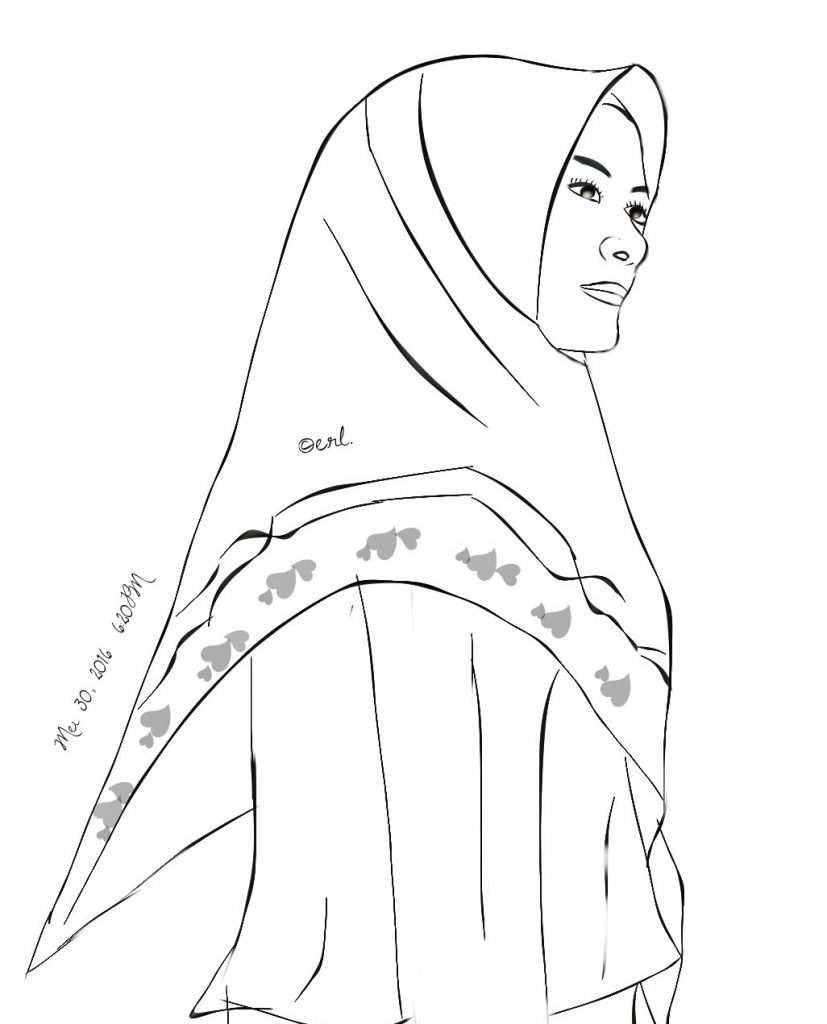
Hijab (drawing by getdrawings.com)
Today many women in hijab face discrimination. Laws to ban women from wearing hijabs are being passed in various countries. This marginalises them from education and higher employment. In addition, the hijab has become a political tool for getting elected. At the same time, in some countries, women are forced to wear hijabs.
Bibi Shariman Ali is a role model for all women, girls and hijab-wearing girls. And she reflects on the issue.
“I am happy that I have chosen to wear the hijab, even though I am exposing myself to Islamophobia. When I started wearing the hijab, I remembered a Guyanese telling me that ladies from Islamic countries, such as Pakistan, are throwing off their hijabs, so it is hard to understand why Guyanese are wearing them. I also encountered, on a few occasions, some alienation. Regardless, since wearing my hijab, I have become more confident even though I might be the only one among scores of people. I don’t feel I have to fit into other people’s lifestyle, and I am happy that I can be who I am.”
Shariman continues, “I have been evolving spiritually over the years, having performed hajj (pilgrimage to Makkah, the 5th pillar of Islam) and it all felt incomplete without the hijab. I felt incomplete. I know that in some countries, women rebel against the hijab because of the compulsion to wear it. The most we should do is guide people using the Quran and the Hadiths as our reference point and be role models for others.”
Books, Movies & Role Models
On a lighter note, Bibi Shariman shared her all-time favourite movie. She grew up watching Bollywood.
“I grew up looking at Bollywood movies, and to date, those old Bollywood movies that I looked at remain my favourite. Those movies had strong content and messages that were inspirational and thought-provoking. Most of those films depicted strong values such as loyalty, earnestness, honour, chivalry, sacrifice, respect, service, and responsibility and portrayed love as all-encompassing. The music was soft and sweet. My all-time favourite is Mother India. If there is a movie, regardless of its genre or origin, that does not have any form of obscenity but strong content, I will watch it.”
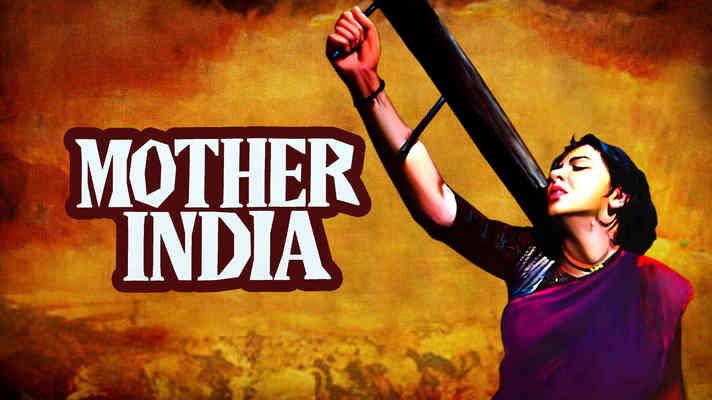 Mother India is a Bollywood classic directed by Mehboob Khan. The main actors were Nargis (Fatima Rashid), Sunil Dutt, Rajendra Kumar, and Raaj Kumar. The lyricist was Urdu poet Shakeel Badayuni and songs by the legendary Shamshad Begum, Mohammad Rafi, Lata Mangeshkar, and Manna Dey and music composed by Naushad Sahib.
Mother India is a Bollywood classic directed by Mehboob Khan. The main actors were Nargis (Fatima Rashid), Sunil Dutt, Rajendra Kumar, and Raaj Kumar. The lyricist was Urdu poet Shakeel Badayuni and songs by the legendary Shamshad Begum, Mohammad Rafi, Lata Mangeshkar, and Manna Dey and music composed by Naushad Sahib.
An English Teacher and avid reader, Bibi Shariman shares her favourite authors and books.
“When I was young, I read novels written by Charles Dickens such as Great Expectations, A Tale of Two Cities, Oliver Twist, etc. I like these books because of the themes they explore, such as poverty, discrimination, child labour and other social issues. These issues simultaneously aroused a range of emotions in the characters and the readers. I also liked his style of writing. As an English Literature teacher, I taught books from different periods, genres and writers from different geographical backgrounds. I particularly liked the books written by some of our Caribbean writers like V. S. Naipaul, Sam Selvon, George Lamming and Edgar Mittelholzer. I found the stories in these books relatable as they reflect our culture, struggles, triumphs, and history.”
Inspiration
Bibi Shariman draws inspiration from the life and the Hadiths (sayings) of Prophet Muhammad (SAW).
“I draw inspiration from the life and the hadiths (sayings) of Prophet Muhammad (SAW) and my mother, whom I consider a phenomenal woman. She is an example of an industrious, caring, loving, generous, and self-sacrificing woman. I also draw inspiration from notable persons such as Mahatma Gandhi and Nelson Mandela and poets such as Khalil Gibran and Maya Angelo.”
Glossary of Terms
Hazrat= Mister (Mr)
Janaab = Sir
Meah/Miah = Gentleman
You can read more about Bibi Shariman Neshaw Ali in this piece by Guyana Chronicle
